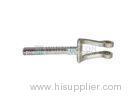Precision investment casting made of stainless steel 17-4PH NDT performed.
Quick Detail:
- Casting of Entry terminal for safty industry;
- Material: 17-4PH or ANC22;
- Casting type: silica sol lost wax method;
- Foundry with PED 97/23/EC & AD2000 W0 Certifications;
- ISO9001:2008 certificated;
- Heat No. kept from tracing;
- NDT such as Dye test, X ray test performed.
Description:
The most common material that Winnington cast:
Stainless Steel (70%) | Carbon Steel (20%) | Alloy Steel (10%) |
303, 430, 420, CF3M (AISI 316L), CF8M (AISI 316), CF8 (AISI 304),CD4MCu, CD4MCuN,ANC20,1.4408,1.4517, 1.4306, 1.4581, 17-4PH, ANC22, SCS1 and more | WCC, 1020, S355JR, SCS16, SCS14, SCS13, 1.0619, WCB, 1045 , LCC and more | ANC2,CLA12C,42CrMo,7Q,8Q,4140,6150 and more |
Investment Casting Process:
1. Was Die making. A wax mould is made according to the CAD system.
2. Wax Pattern Injection. Molten wax is poured into the mould and formed a model that exactly same shape as the cast part.
3. Wax assembly. The wax patterns are connected to the runner system by hot knife according to certain rules. When this finish, a pattern tree is ready.
4. Slurry Coating. The wax pattern tree is dipped into a slurry of silica, then into a sand-like stucco, or dry crystalline silica of a controlled grain size. The slurry and grit combination is called ceramic shell mould material, although it is not literally made of ceramic. This shell is allowed to dry, and the process is repeated until at least a half-inch coating covers the entire piece. The bigger the piece, the thicker the shell needs to be.
5. Dewax. The ceramic shell-coated piece is placed cup-down in an autoclave, who hardens the silica coatings into a shell, and the wax melts and runs out. This process makes hollow in the shell where formerly occupied by the wax.
6. Casting. The shell is preheated in the clave to harden the patches and remove all traces of moisture, then placed cup-upwards onto a sand bed. Metal is melted in a furnace, then poured carefully into the shell. The shell has to be hot because otherwise the temperature difference would shatter it. The filled shells are then allowed to cool.
7. Release. The shell is hammered or sand-blasted away, releasing the rough casting. The gates, which are also created in metal, are cut off.
8. Post treatment. The casting is shot blasted and then machined to required tolerance if necessary. Further finish like plating or polishing can also be operated according to customer needs.
Applications:
Chemicals
Engine & Transport
Fluid control
Machinery
Oil & Gas
Power generation
Paper pulp
food processing
wastewater solution
Marine
Specifications:
Casting weight | 10g~80kg |
Wall thickness | 1.5-2mm Min |
Standards | ASTM,JIS,DIN,BS,MIL |
Casting weight | 10g~80kg |
Casting process type | silica sol lost wax casting |
Machining | CNC machining,CNC lathe |
Surface finish | pickled, zinc plating, black phosphating ,vibration polishing, electro polishing, satin polishing, hand polishing |
Tolerances | Raw Casting tolerances in drawing are according to DIN VDG-Merkblatt P-690; Dimension less than or equal to 24mm will in accordance to D1 standard; Dimension greater than 24mm will in accordance to D2 standard |
Competitive Advantage:
Winnington One-stop Services
With 14 years of experience in precision casting fields, we have established mature process of casting:
Tool Making
With in house expertise and tool shop, we have the complete engineering team to create molding / tooling necessary for production
Secondary Machining
We are equipped with High-precision CNC lathe/milling center to process the interior and exterior of various types of curved surfaces such as cylinder, cones, contrate, chamfer, bevel edges, screw thread, milling holes and boring holes, while conforming to the JB/T8324.1-96 Standard.
Testing and Inspection
We provide a number of testing and inspection services including ultrasonic inspection, magnetic particle inspection, material hardness and/or material properties testing.
Surface Finishing
We provide customers with various surface finishing treatments, including mirror polishing, passivation, sand blasting, shot blasting, barrel finishing and vibratory finishing. Or other finishing that required.






